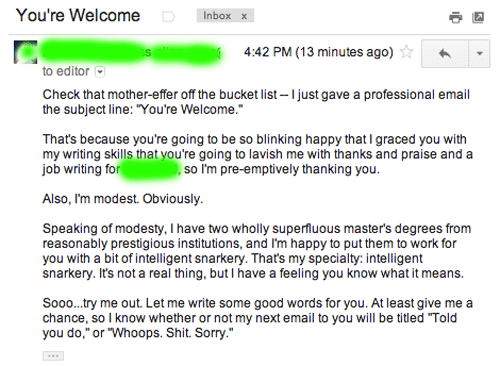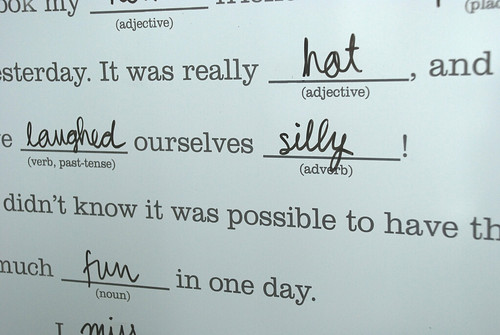Are you trying to write a cover letter, but you’re stumped?
Have you looked for advice online?
Yep. You’re in trouble.
I realize what a position it puts me in, as a person giving advice online, to say you should stop seeking advice online. But hear me out.
I recently saw a link from a resume-writing company giving advice on cover letters. I’m not going to link to this post because I don’t want to give them any more traffic. But here’s what it said:
If you’re a great fit for a particular company or position, don’t be shy about saying so in your cover letter. For instance, if you know that a company just adopted a new IT software system, you could write, “Although I am not an IT professional, my affinity for rapidly learning new software programs has served me well in previous positions. In addition to utilizing technology to complete my work quickly, I am often called upon to assist my peers in learning new systems as they are adopted.”
Another way to show your personal fit is to refer to the benefits of working for a particular company. Are you looking for a large organization that offers tuition reimbursement so you can get your M.B.A.? Say something like, “I particularly appreciate [Company’s] dedication to the professional development of its employees, as demonstrated through its tuition reimbursement program, because I would eventually like to further my education.”
If I were a jobseeker, I would never give this company a penny of my money if this is how they write their cover letters.
I’ll pick apart both sentences.
#1: Telling them you’re a great fit.
“Although I am not an IT professional, my affinity for rapidly learning new software programs has served me well in previous positions. In addition to utilizing technology to complete my work quickly, I am often called upon to assist my peers in learning new systems as they are adopted.”
This is the most grasping-at-straws sentence I have perhaps ever read.
If you’re a great fit for the job, you should be talking about how your primary skills match up with the job requirements. If you were looking for a doctor, would you go to the one who advertised having the most successful surgeries? Or would you choose the doctor who bragged about how good she was with accounting software?
This isn’t to say soft skills aren’t important, but puh-leeze. Focus on the important stuff first. Unless you’re applying for a job where the main requirement is learning new “software programs”, focus on the core strengths you bring to the table.
Extra points taken off for wordiness and thesaurus-ese, as usual. Instead of “my affinity for rapidly learning new software programs,” how about “I pick up new software quickly”? And instead of “In addition to utilizing technology to complete my work quickly,” how about….leaving that out entirely?
“Utilizing” (or “using,” as we cool kids like to say–no really, stop saying “utilizing”) technology is basically a requirement for every job these days, so saying this is the same as saying “I’m barely competent.”
You should absolutely tell employers why you’re a great fit. This is not how to do that.
#2: Talking about their benefits in your cover letter.
“I particularly appreciate [Company’s] dedication to the professional development of its employees, as demonstrated through its tuition reimbursement program, because I would eventually like to further my education.”
DO NOT DO THIS. If any resume/cover letter/recruiting firm tells you to do this, run screaming the other way. Yay, they have great benefits. You don’t want a hiring manager thinking you’re applying only for the paycheck, or the tuition reimbursement, or the health insurance. Find something else to focus on that shows you’re an interested and engaged candidate. If you can’t think of anything interesting about the work they’re doing, are you sure you want the job? (Yes? You’re broke? Fine, but still don’t talk about how much you want their bennies.)
This is why people get stuck. They read shitty advice online and follow it. So now I’m asking you to read my non-shitty advice and follow it. I know, I know. But hey. How well has the old way been working out for you?
Isn’t it time to try something new?


